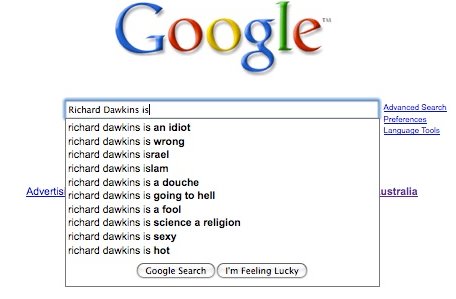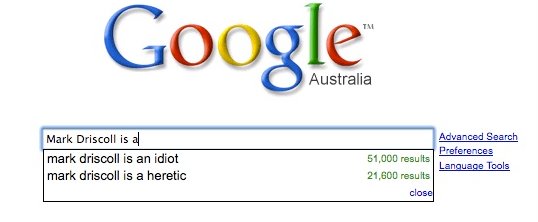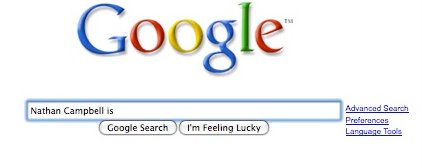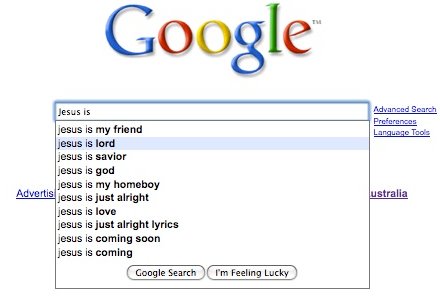To the Editor, Prospect Magazine,
Dear sir, it has come to my attention as a citizen of the internet, that your, until recently, esteemed publication has named polemicist Richard Dawkins as number one on your “world thinkers” list for this year.
I understand that this poll is, in essence, well in every sense, a popularity contest, and thus is not really indicative of the intellectual lay of the land… or globe. Even if some 70% of practicing “philosophers” are atheists according to a recent study, Richard Dawkins isn’t even atheism’s top thinker. Alain de Botton, and Lawrence Krauss must surely trump him in the brain stakes. Ricky Gervais tops him in the wit stakes. And Penn Jillette tops him in the making magic appear to happen when he opens his mouth or moves his hands stakes…
Far be it from me, an unpublished writer of an unpopular, by any real measure, blog, to call your judgment into account when it comes to publishing this sort of list after soliciting advice from an expert panel constituted of “the masses” (I understand your survey drew more than “10,000 votes from over 100 countries” in “online polls”) but I just wanted to humbly remind you that this is, after all, the same internet that attempted to send Justin Bieber to North Korea, sent Pit Bull to Alaska, and continues to be enamoured with web polls that present opportunities for Pharyngulation. This feels a lot like one of those events.
You see, dear Prospect, there is a real chance that in proclaiming that the person with a large social media presence is the world’s foremost thinker, in a study that is a result of a poll conducted on the Internet, that you may open yourselves to being considered what the youth of today might call a “numbnuts”… such polls aren’t just open to manipulation, they lend themselves to manipulation, and your analysis of the poll which trumpets the power of social media essentially invites manipulation.
Dawkins, as much more learned people than I – like literary critic Terry Eagleton – would attest, is guilty of a little bit of overreaching when it comes to lambasting his opponents, and underreaching when it comes to, well, thinking… As Eagleton puts it (in the London Review of Books):
“Imagine someone holding forth on biology whose only knowledge of the subject is the Book of British Birds, and you have a rough idea of what it feels like to read Richard Dawkins on theology. Card-carrying rationalists like Dawkins, who is the nearest thing to a professional atheist we have had since Bertrand Russell, are in one sense the least well-equipped to understand what they castigate, since they don’t believe there is anything there to be understood, or at least anything worth understanding. This is why they invariably come up with vulgar caricatures of religious faith that would make a first-year theology student wince. The more they detest religion, the more ill-informed their criticisms of it tend to be…
…Dawkins holds that the existence or non-existence of God is a scientific hypothesis which is open to rational demonstration. Christianity teaches that to claim that there is a God must be reasonable, but that this is not at all the same thing as faith. Believing in God, whatever Dawkins might think, is not like concluding that aliens or the tooth fairy exist. God is not a celestial super-object or divine UFO, about whose existence we must remain agnostic until all the evidence is in. Theologians do not believe that he is either inside or outside the universe, as Dawkins thinks they do. His transcendence and invisibility are part of what he is, which is not the case with the Loch Ness monster. This is not to say that religious people believe in a black hole, because they also consider that God has revealed himself: not, as Dawkins thinks, in the guise of a cosmic manufacturer even smarter than Dawkins himself (the New Testament has next to nothing to say about God as Creator), but for Christians at least, in the form of a reviled and murdered political criminal. The Jews of the so-called Old Testament had faith in God, but this does not mean that after debating the matter at a number of international conferences they decided to endorse the scientific hypothesis that there existed a supreme architect of the universe – even though, as Genesis reveals, they were of this opinion. They had faith in God in the sense that I have faith in you. They may well have been mistaken in their view; but they were not mistaken because their scientific hypothesis was unsound.”
In Dawkin’s defence – he doesn’t have time to worry about sky fairies, or publishing intellectually credible and honest works – he’s lining his pockets with the proceeds of the angry anti-religious screeds published in the guise of popular science or philosophy books – and as you point out in his bio, appeasing his horde of Twitter disciples with cameo turns on the Simpsons. He is a busy gent. He’s too busy to debate serious opponents, and he’s been far too busy to publish original academic work in a peer reviewed science journal since 1980. You know this. Because your own biography of the world’s leading thinker has almost nothing to say about his capacity as a thinker.
When Richard Dawkins, the Oxford evolutionary biologist, coined the term “meme” in The Selfish Gene 37 years ago, he can’t have anticipated its current popularity as a word to describe internet fads. But this is only one of the ways in which he thrives as an intellectual in the internet age. He is also prolific on Twitter, with more than half a million followers—and his success in this poll attests to his popularity online. He uses this platform to attack his old foe, religion, and to promote science and rationalism. Uncompromising as his message may be, he’s not averse to poking fun at himself: in March he made a guest appearance on The Simpsons, lending his voice to a demon version of himself.
How deliciously ironic that in trying to feed an internet culture predicated on the popularity of memes, and the sharability of lists, that you’ve given top billing to this English gentleman and then damned him with faint praise. Is this the biography of a leading intellectual? I’ve bolded the bits that refer to his contributions as a “thinker” rather than as a rabid attack dog operating in an area in which he has only the credibility afforded him by his tribe of minions.
37 years ago he had a good idea. And now he’s a crotchety old man with a megaphone. Here are ten “public intellectuals” with more Twitter followers than Dawkins who you might like to consider for next year’s list. I’ve put stars next to the ones who have been on the Simpsons.
- Justin Bieber (approx 39.1 million)*
- Lady Gaga (approx 37.3 million)*
- Katy Perry (approx 36.5 million)*
- Rihanna (approx 29.6 million)
- Taylor Swift (approx 27.8 million)
- Britney Spears (approx 26.9 million)*
- Shakira (approx 20.6 million)
- Justin Timberlake (approx 20.2 million)* (in N Sync)
- J-Lo (approx 18.2 million)
- Kim Kardashian (approx 17.8 million)
I hope this helps. I look forward to reading a more rigorously and well thought out (ie not dumb) approach to identifying “world thinkers” in the future. Unless your link bait strategy was to be very clever and ironic and I’ve missed the joke.
Sincerely,
Nathan








